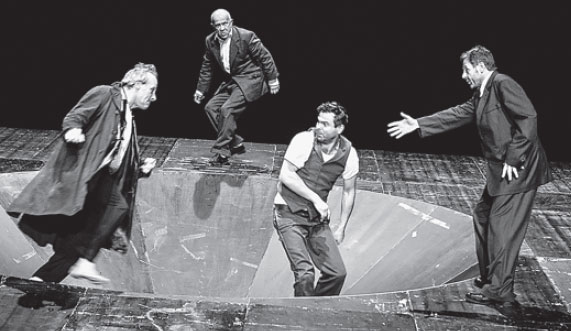Productions to showcase variety of German theater offerings
Thomas Oberender, artistic director of the Berliner Festspiele, an arts center that brings together a variety of arts and culture events under one roof each year in the German capital, made his first trip to China in 2014, and he says the visit was beyond his expectations.
He went to Wuzhen, a small town in Zhejiang province, which is about a two-hour drive from Shanghai, to attend the Wuzhen Theater Festival, a 10-day event showcasing international theater works and original Chinese dramas from young talents.
Impressed by the old houses and warehouses, which were renovated and turned into performance venues, Oberender was also surprised to see how Chinese audiences embraced the theater works and how passionate the young Chinese theater talents were.
|
Waiting for Godot by Deutsches Theater Berlin will help Chinese audiences better know German theater. Provided to China Daily |
Six months later, Oberender was invited by Wu Promotion, a private Chinese event promotion agency for the performing arts, to bring the Berliner Theatertreffen, one of the festivals under Berliner Festspiele, to China.
Oberender was excited and agreed.
In 2015, Wu Promotion reached a five-year partnership agreement with Berliner Theatertreffen to bring productions from the famous theater festival to China from 2016 to 2020.
From June 20 to July 9 this year, three selected Theatertreffen productions are being staged for the first time in Beijing and Shanghai.
The productions are Deutsches Theater Berlin's version of Waiting for Godot, Maxim Gorki Theater Berlin's Common Ground and Deutsches Schauspielhaus Hamburg's John Gabriel Borkman.
"Personally, I am very interested in Chinese culture, especially after I visited Wuzhen and learned how alive the Chinese theater scene is," Oberender said during his recent visit to Beijing. "We take this opportunity not just to stage theater works from Germany but also to communicate with Chinese audiences and Chinese theater talent."
According to Oberender, who has been working at Berliner Festspiele since 2012, the three works being staged in China deal with problems such as the economic crisis, the migrant crisis and the refugee crisis.
"With globalization and urbanization, these issues exist not just in Europe but worldwide. Like many places in the world, Berlin as a diverse European metropolis is experiencing a social transition. We have many diverse cultures joining in, which inevitably causes severe social and cultural conflicts in our societies," he says.
"Through theater, we want to talk about how people, especially the younger generation, deal with social changes and how to get accustomed to these changes."
Berliner Theatertreffen, first held in 1964, is one of most important cultural events in German-speaking countries. Each May, at Berliner Theatertreffen, 10 works are selected from more than 400 new productions in the previous season and staged in Berlin.
For the performances in China, a jury comprising three Chinese and two Germans - including Shen Lin, director of the Drama Institute of the Central Academy of Drama; Yvonne Budenholzer, director of Berliner Theatertreffen, and Oberender - was formed to select three works.
Explaining how the works were chosen, Jiang Tao, deputy director of the program department of the National Center for the Performing Arts, which is the Beijing venue staging the three productions, says: "The (three) German theater works are not well-known to Chinese audiences. By choosing these works, which include contemporary plays and new interpretations of classical pieces, we hope to show the uniqueness and variety of the German theater scene. We want to establish a long-term plan to bring German dramas to China."
One of the productions is Common Ground by Maxim Gorki Theater, directed by the theater's in-house director, Yael Ronen.
Hailing from a theater family and considered as one of the most exciting theater directors of her generation, Ronen tells the story of the younger generation and immigrants from the former Yugoslavia.
"When we started (working on the play), we had no idea where we were heading. Many of the actors came to Berlin from Belgrade and Sarajevo. We developed the play together, which was based on a trip to Bosnia," says Ronen.
One of the actors performing in Common Ground is Dejan Bucin, who was born in 1985 in Belgrade, now capital of Serbia.
Speaking of his experience with the play, Bucin says: "We rarely talk about our family's experiences, which is taboo. During the process of producing this play, we built trust with the director and the actors. The theater then becomes a safe space to discuss things like guilt and atonement, forgiveness and forgetting.
"Typically, we play different roles on stage, which are about other people's lives. But with Common Ground, we tell our own stories. It is an unconventional experience."

























